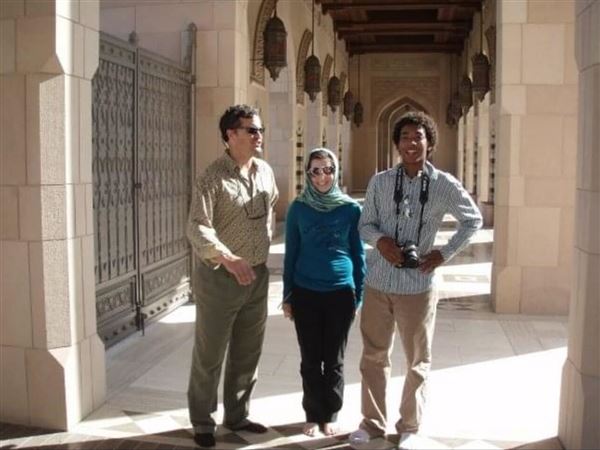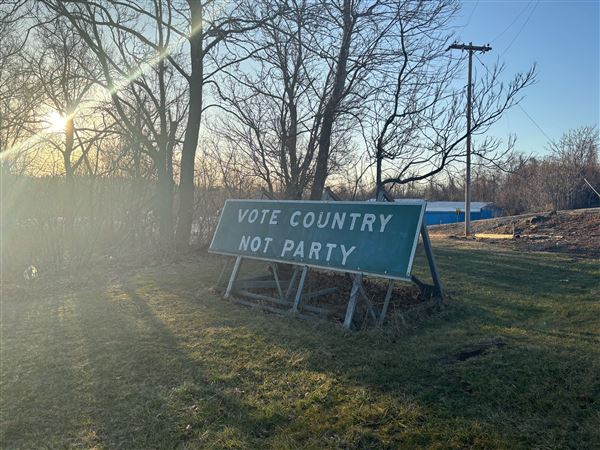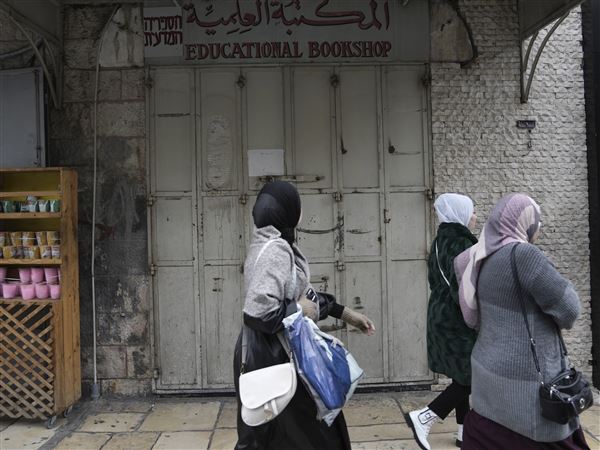MORGANTOWN, W.Va. -- One of the last friendly faces Wall Street Journal reporter Daniel Pearl saw before he was kidnapped and murdered in Pakistan in 2002 was that of Asra Nomani, an American Muslim who was a close friend and Journal colleague.

Asra Nomani carries her son, Shibli Nomani, 18 months, outside the Islamic Center of Morgantown before services on Friday. Nomani is embroiled in a dispute with mosque leaders over the role of women in mosque affairs.
Click photo for larger image.
Pearl's murder, which came after he was forced to say he was a Jew, galvanized a new concern in the Indian-born journalist for Islam and its relationship to society.
Pregnant and unmarried, she returned to Morgantown, where she had grown up and graduated from West Virginia University. Last year, she decided to attend the mosque that her father, now a retired WVU professor, had helped found 23 years ago.
"I had just had a baby, and you want to find religion with your baby," she said. "I went to the front door of the mosque and the board president yelled at me to take the back entrance. I had to sit in the balcony."
So began her moral jihad against the leadership of the Islamic Center of Morgantown, which she has taken to the editorial pages of The Washington Post and The New York Times. By her account, puritanical Arabs, whom she labels Wahhabis, a disputed and pejorative term for the strict strain of Islam centered in Saudi Arabia, have seized control and are pushing a theological agenda that demeans women and teaches contempt for non-Muslims.
Leaders of the mosque say they can't understand why she is so angry and confrontational. Pearl's death was a horrible crime but has nothing to do with whether Muslim women in Morgantown sit in the balcony, they say.
"She doesn't seem to have anything better to do than to fight her fellow Muslims," said Ahmed El-Sherbeeny, a WVU doctoral student in engineering who gives the call to prayer and whose recent sermon on women outraged Nomani.
The mosque has no prayer leader, or imam, and the disputed leadership was put to the test in voting over the weekend for a new executive committee. Last Friday, parking was tough to come by as members gathered in the beige brick center built last year on a side street near the campus.
Nomani, accompanied by her son and parents, wore a hooded sweat shirt, her nod to the practice of women covering their hair during prayer service. She expected little from the election and, in fact, didn't bother to vote.
She was one of a tiny minority of women among more than 100 men. But by some at the mosque, she is viewed as a minority of one. They insist there was no friction or debate until she created it.
"You saw ladies going in there, right?" Ahmad Abulaban, an executive committee member, said to a reporter, gesturing toward the mosque. "Did you see any problems at all, any friction? We're not hateful people. She's trying to use the community as a bridge to fame."
Islam is united in its core belief in one God, in the importance of the Prophet Muhammad and the practices of prayer, fasting, charity and pilgrimage. But Muslims from Algeria to Malaysia have developed different ways of doing those things. As global immigrants find themselves sharing the same mosques in America, tensions arise.
As in Morgantown, the conflicts are often riddled with cultural subtexts, including the uneasy relationship between Arab and Asian Muslims. The problems become most acute in places like Morgantown, where there is only one mosque, said Omid Safi, professor of Islamic Studies at Colgate University and author of "Progressive Islam," which advocates gender equality and pluralism.
Because of a lack of theologically trained religious leaders, it's not uncommon for new American immigrants nurtured on a zealous, anti-Western Islam to assume mosque leadership, he said.
Nomani regards the Islamic Center of Pittsburgh as a model for Morgantown to follow. Women can enter through the main door of the mosque in Oakland and worship with the men, though seated behind them.
Dalia Mogahed, outreach coordinator for the Pittsburgh mosque, agrees on Muhammad's respect for women but says Nomani is viewing the issues through the eyes of a secular feminist rather than the eyes of a Muslim. And Mogahed, who was born in Egypt, believes Nomani's essays are implicitly anti-Arab.
Although Mogahed usually enters the mosque through the front door, there is a separate entrance for women who prefer to use it. Many Muslim women embrace this separation because they believe it offers freedom and privacy, she said, and it is wrong to paint them as oppressed dupes of Muslim men.
Nomani, 38, was born in Bombay, India. The family emigrated when she was 4 and became the second Muslim family in Morgantown when she was 10.
The original mosque was built without any provision for women, who were forced to pray in a stifling back room that the men often invaded. "That is something my father apologizes to me for. Twenty-three years ago he didn't even recognize women's rights within the mosque."
Nomani's journalistic career took her across the globe, and she often wrote stories on sexual practices for The Wall Street Journal. After 9/11, she took an assignment for Salon.com in Pakistan, where she hosted Pearl and his wife just before he left for his fatal interview.
"We spent a month trying to find him," she said. "In that month I came face to face with the slippery slope of where hatred can take us."
At about the same time, Islamic extremists in Pakistan murdered a dozen Shiite professionals because they didn't believe that Shia Islam was pure enough.
"I used to be very relativistic and say that we had to accept all these different ideologies without censorship," she said. "Now I think there have to be limits to tolerance. It would be like someone in 1950s America saying that you have to be tolerant of white supremacists."
So when she was told to go to the back door and sit in the women's balcony, she resisted. She tracked down Islamic scholars who convinced her that Muhammad allowed men and women to pray together. She found a study of more than 400 U.S. mosques showing that the percentage requiring women to worship behind a curtain or partition had increased from 52 percent in 1994 to 66 percent in 2000.
She blamed it on the growing influence of Saudi and Egyptian schools of Islam among Muslims studying here. With her mother, sister-in-law, niece and one or two young girls, she persisted in praying with the men. Despite cutting remarks, they allowed her to do so, she said.
Late last year, the mosque leadership collapsed -- due, by various accounts, to infighting, fatigue, apathy or all of the above. Into the power vacuum stepped a "temporary executive committee." To Nomani, it was a coup by extremists. Others say someone had to step forward to make sure that basic maintenance got done.
Nomani took her complaints to outside organizations. One was WVU -- on the grounds that some of the offending preachers were students or faculty. Another was the Council on American-Islamic Relations (CAIR), which investigates complaints of discrimination against Muslims.
Last month, she lodged a complaint about a sermon in which a student declared that "to love the Prophet [Muhammad] is to hate those who hate him." He claimed that "the most wonderful example of love" was an early Muslim who killed his own relatives in battle when they attacked Muhammad, she said.
In response to Nomani's compalint, Hany Ammar, a mosque executive committee member, denied that the sermon preached hatred, although he said that difficulties in translation from Arabic could have caused misperception.
He offered to meet with Nomani but accused her of disruptive behavior for taking notes during sermons. Not only does the rustling paper disturb worship, it also "causes an emotional distraction in many people because they have become aware that Ms. Nomani uses these notes to lodge complaints against her own community," he said.
Normally, CAIR does not intervene in intra-mosque disputes, said spokesman Ibrahim Hooper. But because this case has become so public, CAIR is investigating with an eye toward possible mediation.
Nomani said that El-Sherbeeny's April 30 sermon on women, which ignited the most recent dispute, attacked Egyptian Islamic feminists as "advocates of hell" and said that when a woman loses her chastity "she is worthless."
El-Sherbeeny admits saying that, but said Nomani ignored his larger point that women are held in high respect within Islam. "Women are to be cared for and supported financially and physically as wives and daughters and sisters. And women have a responsibility to preserve their chastity and their honor."
He realized his sermon would strike a sensitive nerve with Nomani, a single mother. But her problem isn't so much what he called her "great sin," but what he perceives as a lack of repentance.
WVU administrators aren't about to intervene. "I think the best thing we can do is be respectful," said Brent McCusker, who teaches geography of the Middle East.
Still, he wonders if Nomani's essay in Thursday's New York Times will alter the dynamic of what has been essentially a low-profile dispute within a local institution.
"I think a lot of people will be watching," McCusker said. "It's going to be under scrutiny now."
Friends and foes have suggested that Nomani find or found another mosque, but she would consider that surrender. "If we walk away, we are really abandoning our responsibility to the religion," she said. "To me this is really a fight for Islam."
Hatem Bata, a WVU senior, feels he is caught between warring parties and says he is typical of the community of about 350. He agrees with some of Nomani's concerns but "there is extremism from both sides," he said.
After the results of the weekend vote were made public yesterday, Bata said he considered them a source of hope in that the executive committee, which he said was all far right, is now more moderate.
Nomani, who had declared her candidacy for the nine-person executive committee but withdrew, was more circumspect in assessing the results.
"The challenge today is the same as yesterday -- can the voice of moderate, tolerant and inclusive Muslims define our mosque in Morgantown? If it can, it's a victory for not only Islam but also the world."
First Published: May 11, 2004, 4:00 a.m.
















